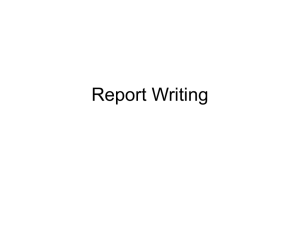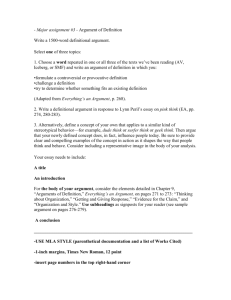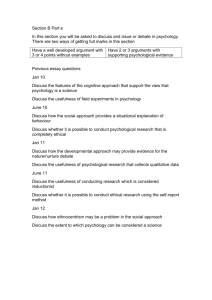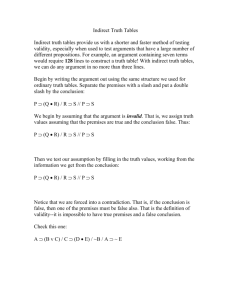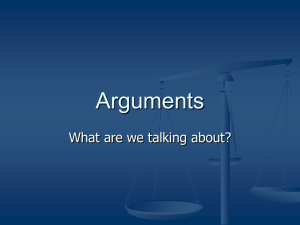Section 1 Paper Topics
advertisement
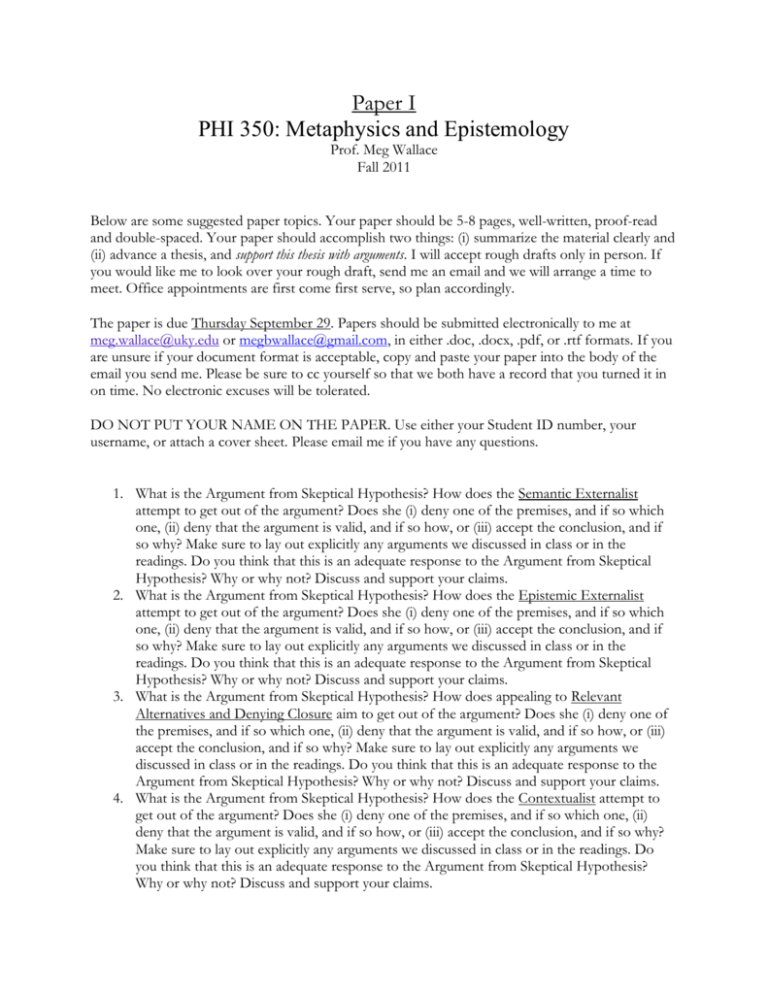
Paper I PHI 350: Metaphysics and Epistemology Prof. Meg Wallace Fall 2011 Below are some suggested paper topics. Your paper should be 5-8 pages, well-written, proof-read and double-spaced. Your paper should accomplish two things: (i) summarize the material clearly and (ii) advance a thesis, and support this thesis with arguments. I will accept rough drafts only in person. If you would like me to look over your rough draft, send me an email and we will arrange a time to meet. Office appointments are first come first serve, so plan accordingly. The paper is due Thursday September 29. Papers should be submitted electronically to me at meg.wallace@uky.edu or megbwallace@gmail.com, in either .doc, .docx, .pdf, or .rtf formats. If you are unsure if your document format is acceptable, copy and paste your paper into the body of the email you send me. Please be sure to cc yourself so that we both have a record that you turned it in on time. No electronic excuses will be tolerated. DO NOT PUT YOUR NAME ON THE PAPER. Use either your Student ID number, your username, or attach a cover sheet. Please email me if you have any questions. 1. What is the Argument from Skeptical Hypothesis? How does the Semantic Externalist attempt to get out of the argument? Does she (i) deny one of the premises, and if so which one, (ii) deny that the argument is valid, and if so how, or (iii) accept the conclusion, and if so why? Make sure to lay out explicitly any arguments we discussed in class or in the readings. Do you think that this is an adequate response to the Argument from Skeptical Hypothesis? Why or why not? Discuss and support your claims. 2. What is the Argument from Skeptical Hypothesis? How does the Epistemic Externalist attempt to get out of the argument? Does she (i) deny one of the premises, and if so which one, (ii) deny that the argument is valid, and if so how, or (iii) accept the conclusion, and if so why? Make sure to lay out explicitly any arguments we discussed in class or in the readings. Do you think that this is an adequate response to the Argument from Skeptical Hypothesis? Why or why not? Discuss and support your claims. 3. What is the Argument from Skeptical Hypothesis? How does appealing to Relevant Alternatives and Denying Closure aim to get out of the argument? Does she (i) deny one of the premises, and if so which one, (ii) deny that the argument is valid, and if so how, or (iii) accept the conclusion, and if so why? Make sure to lay out explicitly any arguments we discussed in class or in the readings. Do you think that this is an adequate response to the Argument from Skeptical Hypothesis? Why or why not? Discuss and support your claims. 4. What is the Argument from Skeptical Hypothesis? How does the Contextualist attempt to get out of the argument? Does she (i) deny one of the premises, and if so which one, (ii) deny that the argument is valid, and if so how, or (iii) accept the conclusion, and if so why? Make sure to lay out explicitly any arguments we discussed in class or in the readings. Do you think that this is an adequate response to the Argument from Skeptical Hypothesis? Why or why not? Discuss and support your claims. 5. What is the Argument from Skeptical Hypothesis? How does Nagel attempt to get out of the argument? Does she (i) deny one of the premises, and if so which one, (ii) deny that the argument is valid, and if so how, or (iii) accept the conclusion, and if so why? Make sure to lay out explicitly any arguments we discussed in class or in the readings. Do you think that this is an adequate response to the Argument from Skeptical Hypothesis? Why or why not? Discuss and support your claims. 6. Compare or contrast two different views that attempt to get out of the problem of skepticism. Which one do you think is the most successful and why? Please lay out these positions carefully, as well as any relevant arguments and objections.




